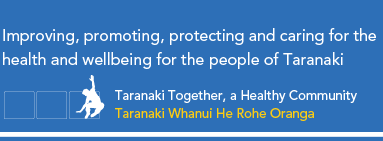No cases of Meningococcal W strain reported in Taranaki
27 November 2018
As Northland prepares for a targeted vaccination programme to control an outbreak of MenW meningococcal disease, Taranaki DHB’s medical officer of health says the Taranaki region is not high risk for this strain at the moment.
Dr Jonathan Jarman confirms that MenW has reached outbreak levels in Northland but Taranaki hasn’t had a case of MenW strain since 2013.
He says “Most cases of meningococcal disease around the world are caused by one of five strains - A, B, C, W135 and Y. Taranaki experienced a number of meningococcal strain B cases earlier this year and a death in a teenage boy from strain C.
“The MenW strain has a high mortality rate and tragically has killed three people in Northland this year. It serves as a timely reminder to the public to be extra vigilant about signs and symptoms of meningococcal disease, which can start like the flu but very quickly worsen.
“It is extremely upsetting for everyone when young people are taken so quickly by this disease, so it is important to be aware of the symptoms and have a good plan if they get sick.”
Meningococcal disease is more common between winter and spring, from May through to September, but it is possible for symptoms to develop at other times of the year.
There have been 25 reported cases of meningococcal disease in Taranaki in the last 10 years, with four deaths.
Dr Jarman explains “The bacteria normally lives in the back of the throat and nose and does not cause illness for most people. Five to 10 per cent of people can carry the bug for a period of time without any illness. It spreads by close contact such as families and people living in the same house/accommodation.
“Unfortunately the bug can cause a highly invasive illness for a small number of healthy people which is impossible to predict beforehand. This is why it is important to seek medical attention straight away.
“Meningococcal disease can be difficult to diagnose in the early stages so go straight back to the doctor or hospital if the person gets worse. Treatment involves a high dose of intravenous antibiotics in hospital and early intervention saves lives.”
Meningococcal disease can progress very quickly and may initially appear as a flu-like illness. The signs and symptoms in a young person or adult can include any of the following:
• High temperatures (fever)
• Headache
• Confusion and sleepiness
• Joint pain, aching muscles and/or neck stiffness
• Dislike of bright lights
• Vomiting
• Red or purple skin rash
The signs and symptoms of Meningococcal Disease in a baby can include any of the following:
• High fever (may also have cool hands and feet or shivering)
• Sleepy or floppy or harder to wake
• Unusual crying
• Stiff neck
• Dislike bright lights
• Vomiting
• Refusal to feed
• Sometimes, red or purple spots or bruises on the skin
If an individual is sick, check them often. Don’t delay to seek medical attention by either:
• Ringing the 24/7 Healthline – 0800 611 611
• Visiting your GP
• Visiting Medicross or Phoenix Urgent Doctors
• Visiting the hospital’s Emergency Departments (ED)
More information can also be found at www.moh.govt.nz/meningococcal
For more information about the Meningococcal vaccine, people are advised to speak to their GP or practice nurse.
ENDS
For more information please call
Beth Findlay-Heath
Communications Advisor
021 665 017


